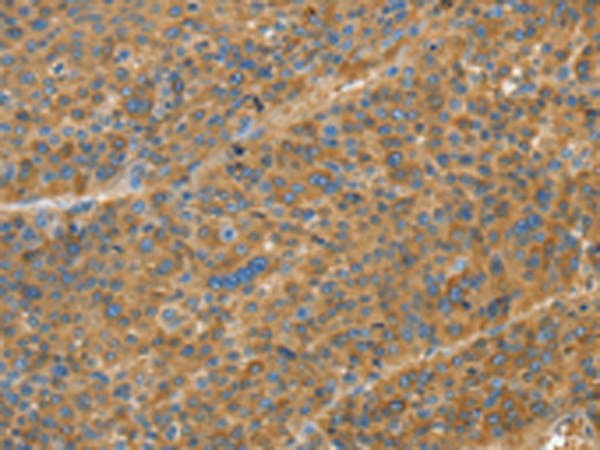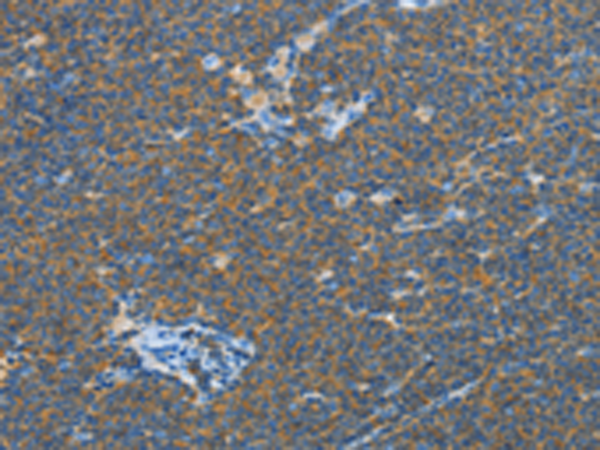


| WB | 1/200-1/1000 | Human,Mouse,Rat |
| IF | 咨询技术 | Human,Mouse,Rat |
| IHC | 1/25-1/100 | Human,Mouse,Rat |
| ICC | 技术咨询 | Human,Mouse,Rat |
| FCM | 咨询技术 | Human,Mouse,Rat |
| Elisa | 1/2000-1/5000 | Human,Mouse,Rat |
| Aliases | DTL; BAFF; BLYS; CD257; TALL1; THANK; ZTNF4; TALL-1; TNFSF20 |
| WB Predicted band size | 31 kDa |
| Host/Isotype | Rabbit IgG |
| Antibody Type | Primary antibody |
| Storage | Store at 4°C short term. Aliquot and store at -20°C long term. Avoid freeze/thaw cycles. |
| Species Reactivity | Human |
| Immunogen | Fusion protein of human TNFSF13B |
| Formulation | Purified antibody in PBS with 0.05% sodium azide and 50% glycerol. |
+ +
以下是关于TNFSF13B(BAFF/BLyS)抗体的3篇代表性文献摘要整理:
---
1. **文献名称**:*Efficacy and safety of belimumab in patients with active systemic lupus erythematosus: a randomised, placebo-controlled, phase 3 trial*
**作者**:Furie R, et al.
**摘要**:该研究报道了抗BAFF单抗Belimumab在系统性红斑狼疮(SLE)患者中的III期临床试验结果,证明其通过阻断BAFF与受体结合,显著降低疾病活动度且安全性良好,成为首个获批用于SLE的生物制剂。
2. **文献名称**:*Structural and functional basis of BAFF receptor recognition by the BAFF-neutralizing antibody belimumab*
**作者**:Sankar K, et al.
**摘要**:通过X射线晶体学解析Belimumab与BAFF的复合物结构,揭示了其通过结合BAFF三聚体的关键表位阻断受体相互作用的分子机制,为优化抗体药物设计提供了依据。
3. **文献名称**:*BAFF inhibition for the treatment of B-cell malignancies*
**作者**:Patten PEM, et al.
**摘要**:探讨了抗TNFSF13B抗体在B细胞恶性肿瘤(如非霍奇金淋巴瘤)中的治疗潜力,临床前研究表明其能诱导肿瘤细胞凋亡并增强化疗敏感性,提示靶向BAFF通路的新型治疗策略。
---
以上文献涵盖了抗体作用机制、临床试验及肿瘤治疗应用方向。如需更多文献或扩展领域,可进一步说明具体需求。
TNFSF13B, also known as B-cell activating factor (BAFF) or BLyS, is a member of the tumor necrosis factor (TNF) superfamily and plays a critical role in B-cell survival, proliferation, and differentiation. It binds to three receptors: BAFF-R, TACI, and BCMA, which are expressed on B-cells and plasma cells. Overexpression of TNFSF13B is linked to autoimmune diseases like systemic lupus erythematosus (SLE), rheumatoid arthritis (RA), and Sjögren’s syndrome, where excessive B-cell activity drives autoantibody production and tissue damage.
Antibodies targeting TNFSF13B are designed to neutralize its activity, thereby suppressing pathogenic B-cell responses. Belimumab, a human monoclonal antibody approved for SLE, is a prime example. It binds soluble TNFSF13B, blocking interactions with its receptors and reducing autoreactive B-cell survival. Other investigational antibodies aim to improve efficacy or target membrane-bound forms of TNFSF13B. Research also explores their potential in B-cell malignancies, where TNFSF13B signaling promotes cancer cell survival.
While effective, long-term safety concerns include increased infection risk due to broad B-cell suppression. Ongoing studies focus on optimizing therapeutic windows and identifying biomarkers to predict patient responses. Overall, TNFSF13B antibodies represent a promising approach for modulating B-cell-driven pathologies.
×